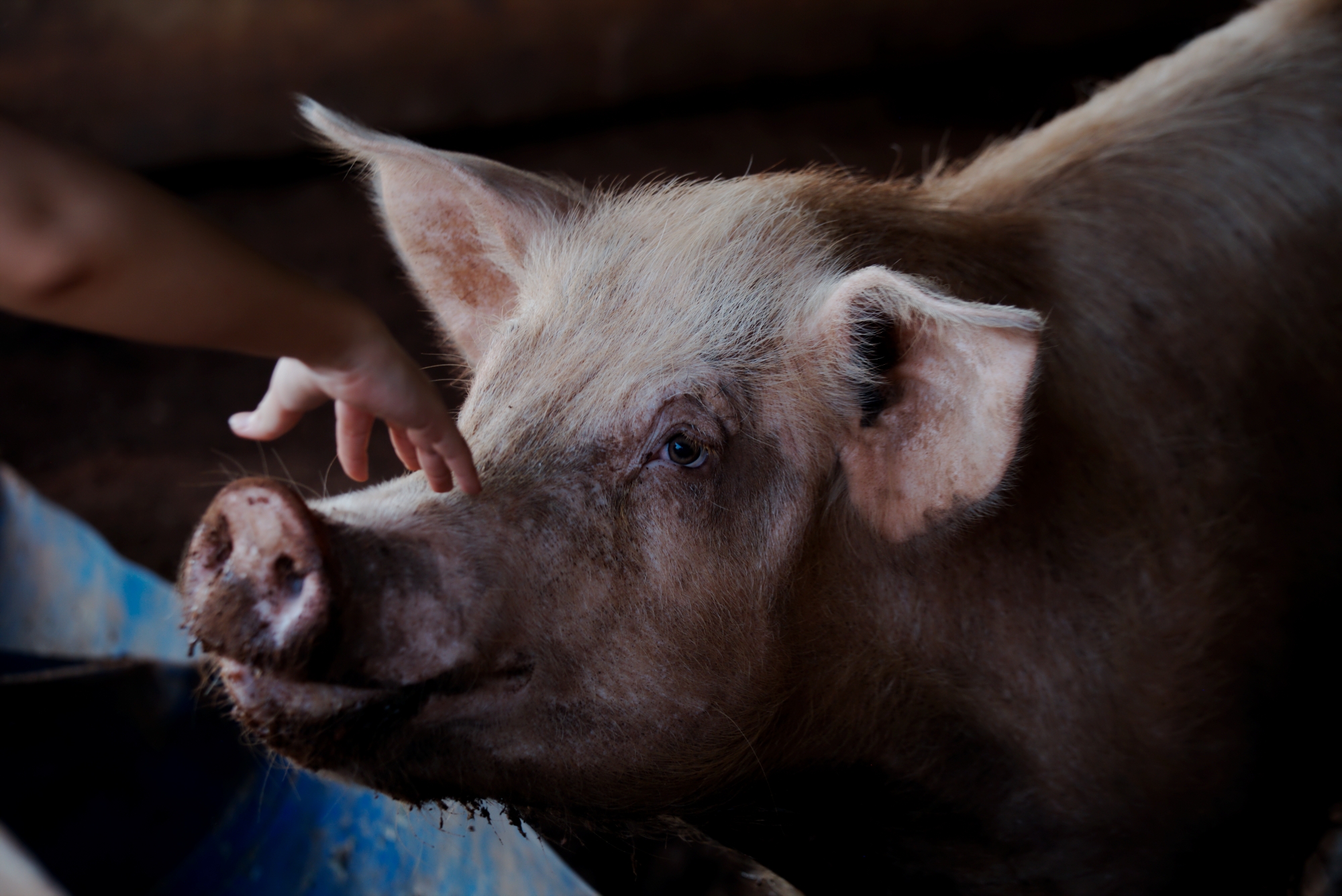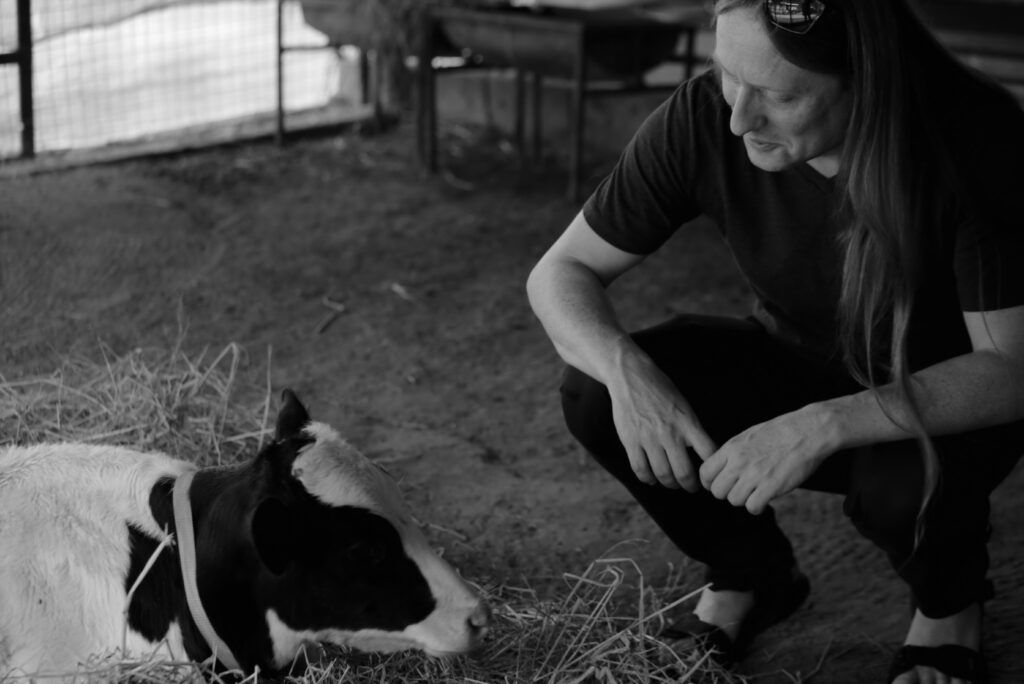Within my writings I have defined spirituality as a philosophy of growth or change, benevolence and compassion. An understanding of a more inclusive interconnected perspective on life. A worldview, or world-experience, of self-improvement with a focus on awareness. It is this understanding of spirituality that ultimately led me to veganism. Many struggle to see the connection and importance of a vegan philosophy within a wider understanding of spirituality. Yet it does not take much, once we let go of preconceptions, to realise veganism is the path of least harm (to animals, the environment, and humans) a vegan perspective on life reminds us that we simply do not need to raise and kill animals to live. Veganism is not a diet, it is compassion and non-violence in practice.

This article will be aimed at informing and sharing the understandings that have helped me to change. These understandings are not intended to judge or demean anyone, my only purpose in writing these words is to show that if our aim is a more spiritually engaged life, then a move towards a more compassionate lifestyle is the most congruent with our goals. In order to explain why, all of us, but especially those who seek to live a spiritual life, would best serve our values through veganism, I will begin by defining what veganism is.
The Vegan Society definition of veganism is as follows:
“Veganism is a way of living which seeks to exclude, as far as is possible and practicable, all forms of exploitation of, and cruelty to, animals for food, clothing or any other purpose.”
So veganism is not another word for a plant-based diet, that is just one aspect of a greater whole. To be vegan means to do the best we can to avoid the products of death and violence. Those words might seem harsh, as they did to me when I heard vegans using them, but that was because I had never stopped to really consider what meat and dairy are. A living feeling animal is born as a result of forcible insemination in most cases, raised for a fraction of his or her natural life-span and then taken to be killed. Consider that, their lives are ended so we can enjoy the flavour of their flesh. Not because it is the only option we have, but because it is convenient, the way things have been in the past and it maintains our belief that we are so much more important than the world around us and the other beings that live in this world. Does that sound like a spiritual, aware, or compassionate life choice?
Veganism sadly often evokes defensiveness and anger in non-vegans, rather than open heartedness or genuine engagement. If you are a person who feels this way towards these viewpoints, then try to consider this information as you would if someone had found a cure for cancer and they wanted to share it, but it required a lifestyle change. Would that anger you? In this case the benefits are visible in multiple areas (including for diseases like cancer), so I hope you will not read every word I write looking for a single weak point, so you can reject it all. I hope that you will treat this information as any other topic, I did once too, and it changed my life.
I was not someone coming from a world of hippy values and leftist politics, as the stereotype often goes. I grew up on a housing estate in London, my father was a dustman and also worked at Smithfield meat market in East London for many years, he served in the Royal Navy before that and politically he supported Margaret Thatcher – I was raised on traditional English foods. I changed because it was the right thing to do, not because it was easy or what my family or peers were doing, I thought for myself and I made the choice when it was far harder than it is today.
There are many misconceptions about veganism, and also about the nature of the animal agricultural industry. I will try to address some of them here, as well as offer resources for those who wish to find out more, or look into the best scientific research available.
Killing
Many will argue that death and killing are a part of nature, they are the way the world is. Of course death and dying are a part of our world, no one will dispute that, but what we are talking about in this article is reducing unnecessary suffering and killing that also causes greater harms to our world and to human health. It is not about choosing a perfect option, no such option exists and deaths will occur, but it is about choosing a better option.
Whether you buy organically raised animal carcasses from a local farm, or a bigger operation the impacts are the same, both to that individual living being (death) and to the world we live in (environmental damage). Ask yourself, would you be happy to be killed for no good reason so someone else could enjoy your body? What if I will promise to do it painlessly or with ‘respect and honour’, would that make any difference to your choice to die? If we are compassionate, ethical people let’s not try and put a happy face on killing without need. We kill these animals because we like the taste of their flesh, we use excuses like humane killing or it’s natural to ease our conscience, we could instead choose to stand against injustice and harm, make the spiritual, ethical, healthy, and environmentally sustainable choice, to stop using the products of needless violence.
So-called, humane meat, shows us we have a desire to do the right thing, or treat other animals with kindness, but we are ignoring the bigger picture and focusing on one aspect of the problem of animal agriculture. The way in which an animal is killed, which does not cause us to reflect on whether they should be raised and killed in the first place. The issue is not just the act of unnecessary killing and making it less cruel, it is also that there is needless killing at all. As I pointed out above, none of us in our right minds would consider dying for the pleasure of another, so why do our spiritual values include allowing it for non-human animals?
While we might assume organic meat would seem a reasonable solution to the problem of the abuses in animal agriculture, in fact in some ways it is actually worse. For example, if cows are raised in the current conventional way (artificially) they will reach maturity, or the age they will be killed, in approximately one year. If cows are raised organically, they will reach the same level in around two years. Therefore, if more people eat organic beef, for example, the environmental impact from the use of water, land, their waste, and the gases they produce, will cause twice the amount of harm compared to the artificially raised cow. Animal agriculture is simply unsustainable, organic or not, if we are to protect our environment.
The focus on organically raised animals also totally ignores the ethical issues, as that animal will still be killed after just a couple of years of life, which as I’ve highlighted is simply unnecessary as we can live healthier lives without meat. Organic animal flesh also does not help reduce the problems of growing levels of obesity, diabetes, high-levels of deficiency in meat eaters (fibre intake for example), and cancers linked to processed and non-processed meat consumption.

Health and Wellbeing
Within the area of human health most informed scientists in the field advocate a whole food plant diet, with extra focus on dark greens and other whole foods. This has been shown to be the best at reducing risk of all cause mortality and especially heart disease, diabetes, and many cancers. Whole plant foods have been shown to be key within ‘blue zone’ diets, the areas of the world where people live the longest, although we could still do better than these diets. In the United States, for example, the Seventh Day Adventists, who eat a plant-based diet as part of their religion, live longer than any other population in the United States and they are vegan or vegetarian (with vegans living the longest).
The focus should be on non-processed foods in their original forms, vegetables, greens, fruits, nuts, legumes, and seeds. As of 2018 I have not eaten meat in more than 26 years, I went to the doctor last year, as I felt I should get checked out, despite having nothing more than a mild cold since I was 16 years old. According to my doctor my blood work came back so good that it put me in the top 5% of the UK population, with nothing wrong at all.
On the other hand meat eaters in general by my age have high levels of deficiency, more than vegans, especially in fibre and have developed signs of heart disease (these signs begin in children eating meat and dairy). As there is nothing in meat and dairy we cannot get from other sources and meat and dairy are actually linked to a huge array of health conditions, we have to question why we would want to eat non-human animals and their milk?
If you are doubting the health benefits of a whole food plant diet, consider how we react to illness in the wider culture in which we live. If a meat eater becomes sick or develops a serious condition, people rarely if ever say, “the meat made you sick”. However, scientifically speaking that would be far more likely and is the reality we live in with diabetes, cancer, heart disease and obesity at record levels.
For the record my father has cancer (a form directly linked to meat eating) and has diabetes (also linked to animal fats), so I’m all too aware of the reality of what diet can do. Probably, the best resource on the internet for nutritional science, with each video referencing the latest research is: http://nutritionfacts.org/ if you would like to find out more.
Physiology
Whilst it is true humans have some adaptations due to our cultural consumption of meat and dairy, our physiology is much the same as the other great apes. Our closest relatives are bonobos and chimpanzees, with whom we share a common ancestor, both are classed as primarily frugivores or herbivores, meaning they eat predominantly fruits and plants. While they do consume insects, small birds and monkeys, the highest meat consumer of the two is the chimpanzee, yet animal foods make up only around 2% of their diet. Humans are also primates and have basically the same gut, teeth, organs etc., are clearly suited to a frugivorous/herbivorous diet, not one high in meat and dairy, which is no doubt why the consumption of these foods is linked to all our major fatal diseases.
Bonobos live a far more peaceful, highly cooperative and sexual lifestyle, and share much in common with our early ancestors. Analysis of the fecal deposits of our ancestors show that they eat a diet with very high levels of fibre or plant matter by today’s standards. The truth when it comes to claims about paleo diets is that our prehistoric ancestors eat depending upon what was available in their geographic location. There was no one paleolithic diet, anymore than there is one human diet today. But what we do know is that generally speaking most ancient peoples eat much higher levels of plant foods than today. Unfortunately, there is no real way to know whether any of this made them healthier, as fatal viruses and disease means we can’t really objectively evaluate their health in modern terms, which is another reason to question the claims about paleo diets.
Even if we had eaten meat in vast quantities in the past, it would also not be an argument for us to do so today, unethical practices have taken place across the world in the past, it is not a justification now. Rape within marriage (until the 1990s in the UK), slavery, animal and human fights to the death, are all things that were once believed to be acceptable in certain contexts. It is clear to me with developments like some primates being afforded rights in some parts of the world, like Germany, that we will eventually see the harms we do now as we do the crimes and ignorance of the past. We have a choice to be on the side of compassion, to be like the ones who stood up against slavery or the oppression of women, even if we would not benefit from our actions.
Sentience and Plants
As plants do not have a central nervous system (necessary for pain perception) it is unlikely that they can experience pain. But even if this unfounded belief that they feel pain is true, most plants reproduce via fruit and their consumption by animals (including humans).
Some will argue that vegans are ignoring plants, but this is not the case, there is in fact a subset of vegan called fruitarians who will only consume foods from plants that are for that purpose, like fruits, beans, nuts etc. If you are someone whose beliefs include sentience, or consciousness within plants, then this would be the best option for you. By becoming vegan you will also save both plants and animals, as less plants will need to be consumed to feed animals to produce meat and dairy.
Much of the clearing of the amazon rain forest is to create grazing land for cattle, or to grow crops for cattle feed, so you will also help reduce the harm to the unique amazon ecosystem, as well as rare plant species by becoming vegan.
As plants can reproduce asexually (via cuttings) it is also clear they are not singular beings in the sense mammals like cows, pigs, dogs, chickens, or humans are. An important point to make is there is also no necessity to kill most plants in order to eat from them, making plant consumption more ethical even if plants were conscious or sentient in some way. Veganism is the path of least harm.
Personal Beliefs
Many in the spiritual community will tell me that their higher-self or their inner guidance leads them to eat meat and dairy. If this is a belief you hold please consider if you would accept such a belief as a reason for a harmful action in another context. We all know of individuals who have done harm in the world because they believed adamantly in a religion or ideology, or simply listened to their inner guidance. While it may seem reasonable to you, consider how such a subjective argument looks to someone else. Imagine a socially unacceptable action like someone being violent towards you, if someone claimed it was their higher-self that guided them to this action, would you accept it?
Non-human animals feel pain, fear and want to live, what if we choose to consider their needs also? What of their consciousness, awareness and their enjoyment of life and living? For example, slavery was long believed to be acceptable, the Bible has many references to it, so people claimed a higher power gave them authority. It was only when we considered the voices of the slaves that things changed. We realised that might does not make right, and exploitation is never ethical. But animals are not human, they are not as intelligent, so therefore it doesn’t matter many claim. Then what of a disabled person, with the mental age of a child, would we use them as ‘things’ as ‘property’, or ‘chattel’? A pig for example has the mental age of a small child, imagine the horror we would feel at the sight of someone harming a child in the way we harm non-human animals.
Respect and Tolerance
Non-human animals have no choice, no way to consent to the harms enacted upon them, no way to stop the violence or their own deaths, yet we feel that inner guidance or our spiritual ‘respect’ for them overrides their needs and even their very lives. That sounds more like abuse than anything the word respect can be attached to.
The choice to harm, and the choice to not harm are not equal positions. If someone were to violate your consent, say by stealing from someone, would you respect that choice? I’m sure you would not, but why? Because we understand that consent, is central, as is making choices that do not cause suffering.
Vegetarianism
I was a vegetarian for 14 years before I became vegan. I thought it was enough, I thought the dairy I consumed was ethical. I sympathise with everyone reading this, waking up to what is happening in our world is horrific, I tried to hide behind ‘humane’ and ‘organic’ claims myself. But I finally realised that in fact consuming dairy and eggs was far from compassionate. Young male cows are often taken to be starved for veal, male chicks are minced or gassed to death, and cows used to give milk face infections, pain, and forced impregnation, as well as the loss of their calf, all so we can have some of their baby food. Again, I ask a simple question, is that necessary? Is that compassionate? Is that spiritual? I think we all know the answer if we are honest with ourselves.
Embracing veganism and non-violence
Earlier this year while I was in Thailand, I had the opportunity to visit a farm animal sanctuary, the only one in the country. I was told hundreds of cows and other animals live there – all would be dead now if it wasn’t for the kindness and compassion of the owner. I spent time with the animals, seeing the trauma in the eyes of some from what they have been through, and saw the sense of freedom in others who have been at the sanctuary longer. The image of the pig at the beginning of this article reminds me not of a thing, but of a living being I met during that trip. Each of the animals I met had a personality, some shy like the cow I am pictured with, others friendly and excited. These animals are no different from dogs and other companion animals we choose to spare the horrors of use and death.
I choose now to live and act for those with no voice of their own, I want to live congruently with my values and to experience the spiritual interconnectedness with the world around me.
Spirituality is an avenue of choice and growth, we have the power to be more than we were. To look out at the world and the predominance of violence and harm and take a stand for non-violence, to nurture peace within our own hearts, to go beyond simply understanding the meaning of the word compassion. To live not by justifying our actions, any position can be justified in some way or another, but being congruent with our actions. We can live free from an industry of pain and death. You can look into the eyes of a cow or any animal and see the awareness, the life looking back at you. To feel empathy, care and to say “no more, I will not be party to needless killing”. Veganism is not a religion, it is a mindful, conscious choice to live by a consistent set of values.

